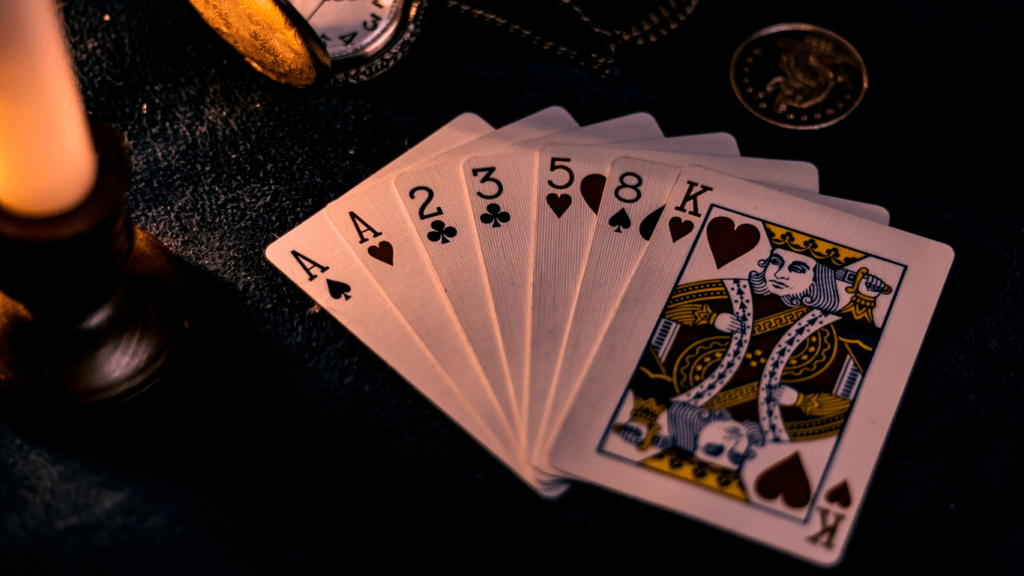Understanding the Basics of Blackjack
Blackjack aims to beat the dealer’s hand without exceeding 21. The game uses a standard 52-card deck, and each card has a specific value: face cards (King, Queen, Jack) are worth 10 points, Aces can be 1 or 11, and number cards hold their face value. Players start with two cards while the dealer reveals one of theirs.
Objective of the Game
In blackjack, the primary goal is to beat the dealer’s total without busting (going over 21). A player busts if the card total exceeds 21, which automatically results in a loss. If both the player and dealer bust, the player loses.
Card Values and Their Importance
Understanding card values is essential for decision-making. Aces, which can be 1 or 11, provide flexibility in forming a strong hand. Face cards, worth 10 points each, significantly impact the game’s strategy. For instance, a combination of an Ace and a 10-point card forms a “blackjack,” the strongest possible hand.
Playing Combinations
Specific card combinations enhance decision-making. Hard hands contain no Aces or Aces valued as 1, while soft hands include Aces valued as 11. For example, a hand of Ace and six (soft 17) differs strategically from a hand of nine and eight (hard 17).
| Term | Definition |
|---|---|
| Blackjack | Combination of an Ace and 10-point card, the strongest hand |
| Hard Hand | Hand that does not contain an Ace, or if it does, the Ace counts as 1 |
| Soft Hand | Hand containing an Ace valued at 11 |
| Bust | Hand exceeding 21 points, resulting in automatic loss |
Dealer’s Role and Rules

The dealer follows specific rules, hitting until their cards total 17 or higher and standing on 17 through 21. Understanding these rules helps predict dealer behavior and make informed decisions.
Strategy Implications
Knowing the basics directly influences strategy. For example, a soft hand like Ace-six calls for hitting to improve the total, while a hard 17 generally means standing. Analyzing these decisions shapes better gameplay.
Understanding these fundamentals is crucial to improving one’s performance. This foundational knowledge assists in applying advanced strategies more effectively.
Common Decision-Making Mistakes
Missteps in decision-making can cost players heavily in blackjack. Recognizing and avoiding these errors is crucial for maintaining a winning edge.
Misunderstanding Hand Values
Incorrect evaluations of hand values can harm your strategy. Many players, for instance, fail to recognize the flexibility of an Ace. Its dual value (1 or 11) can significantly alter your standing. Misinterpreting a soft hand, such as when holding Ace-6 (soft 17), leads to suboptimal choices like standing when hitting is better.
Ignoring Dealer’s Upcard
Neglecting the dealer’s upcard often results in poor decisions. Your moves must consider the dealer’s visible card since it affects their potential to bust. Players tend to stand on a 12-16 (hard hand) despite the dealer’s weak upcard (2-6), which is a mistake. Adjusting your strategy based on the dealer’s upcard improves your chances of winning.
Recognizing and addressing these common errors enhances overall gameplay and decision-making in blackjack.
Strategies to Improve Your Decision-Making
Leveraging proven strategies is essential to enhance decision-making in blackjack. Here are some key approaches.
Basic Strategy Charts
Basic strategy charts outline the optimal moves in any given situation. These charts, based on probability, show players when to hit, stand, double down, or split.
Memorizing these charts improves decision-making and lowers the house edge. Many online resources provide comprehensive charts for different game variations. Following these charts reduces guesswork and helps maintain consistency in gameplay.
Card Counting
Card counting is a technique where players track the ratio of high to low cards left in the deck. This strategy helps predict the likelihood of certain cards appearing, influencing betting and playing decisions.
The Hi-Lo system is one popular method, assigning values of +1 to low cards (2-6) and -1 to high cards (10-Ace). Players adjust their bets based on the count, betting more when the count is positive.
While effective, card counting requires practice and can be challenging, especially in casinos using multiple decks or continuous shuffling machines.
Bankroll Management
Effective bankroll management ensures players can sustain their playing sessions. Allocate a specific amount for blackjack and avoid chasing losses. A common technique is the 5% rule, where players never bet more than 5% of their total bankroll on a single hand.
This approach minimizes the risk of significant losses and allows for prolonged gameplay. Sticking to a predetermined limit prevents emotional decision-making and promotes disciplined play. Consistent bankroll management is vital for long-term success in blackjack.
By incorporating these strategies, players can significantly improve their decision-making, leading to more successful and enjoyable blackjack sessions.
Psychological Aspects of Decision-Making
Effective decision-making in blackjack involves understanding the game’s psychological aspects. Players face stress and distractions, which can impact their performance.
Managing Stress
Stress affects decision-making in blackjack. High-stakes games and pressure situations increase anxiety. I use deep breathing techniques, taking slow breaths to calm my nerves. Short breaks during play help too. These actions reduce stress and enable clearer thinking.
Maintaining Focus
Maintaining focus ensures optimal decision-making. Blackjack tables can be noisy and distracting. I concentrate on the cards, tuning out unnecessary stimuli. Setting specific goals for each session maintains my attention and strategy. Practicing mindfulness exercises before play improves mental clarity and focus.
Tools and Resources
Effective tools and resources can enhance decision-making skills in blackjack. These tools offer practice, strategy development, and real-time assistance.
Mobile Apps
Mobile apps offer convenience for practicing and improving blackjack strategies. Apps like Blackjack 21, Blackjack Strategy Practice, and MyBJTrainer provide practice modes, strategy guides, and real-time decision advice. Blackjack 21 offers various game modes simulating real casino conditions.
Blackjack Strategy Practice helps players understand basic strategy and card counting. MyBJTrainer focuses on coaching users through practice sessions. These apps are available on iOS and Android, making them accessible for on-the-go learning.
Online Simulators
Online simulators offer interactive platforms for practicing blackjack without financial risk. Websites like:
- Blackjack Simulator
- CardCounter.com
- Wizard of Odds
provide realistic game environments, customizable rules, and statistical tracking.
Blackjack Simulator replicates casino conditions and tracks decision outcomes for improvement. CardCounter.com offers card counting practice with real-time feedback on strategy accuracy.
Wizard of Odds provides comprehensive strategy analysis and probability calculations. These simulators help refine decision-making skills by providing endless practice opportunities.

